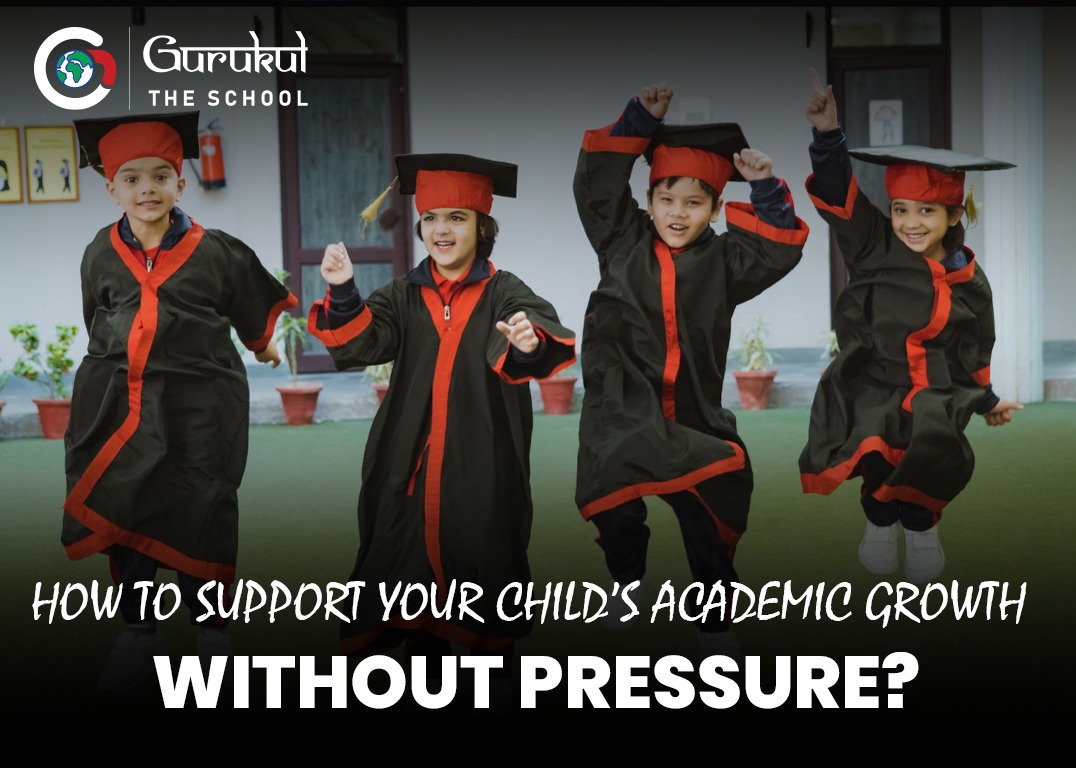How to Support Your Child’s Academic Growth Without Pressure?
posted on Apr 29, 2025
Gurukul The School would like to advise parents to support their child’s academic growth without putting any pressure on them

As parents, it’s natural to want your child to thrive academically. But sometimes, the pressure to succeed can leave both parents and children feeling stressed and overwhelmed. We at Gurukul The School, a top ranking school in Ghaziabad, have seen that many kids don’t perform well under stress and pressure, and as such, even their normal learning process gets hindered. So, if you often nudge your kids to study more, compare their performance with class toppers, and frequently talk about their grade’s impact on their career prospects, stop doing that right away!
You’re unknowingly making your child’s learning experiences stressful and full of pressure. In fact, a troubling trend is currently being witnessed for these reasons—many children are becoming anxious achievers who though manage to excel academically, experience profound disconnection from learning itself.
If you don’t want your kids to have similar experiences, explore healthier ways to support your child’s academic growth without adding pressure. To make it easier, we are sharing in this blog post some of the best strategies that are easy to follow and designed to deliver results. So, let’s delve in and read on.
Every child has a different learning pace. As such, it is best to avoid comparing a child’s learning journey with others. Sometimes, even the brightest minds take a longer time to learn a new concept, and honestly, it should be concerning.
Hence, we at Gurukul The School would like to advise parents to support their child’s academic growth without putting any pressure on them. Instead, as parents, you must try to identify and respect your child’s unique learning pace. This simple change will make your child feel supported rather than rushed in their learning journey. It will give them the necessary time and environment to focus better on their studies and grow sustainably in their academic journey.
-
Managing Your Own Expectations and Anxieties
It may look unrelated to your child’s academic growth, but your own expectations as a parent significantly impact how your child learns and grows academically. If you frequently get anxious about your child’s performance, they may sense it and subconsciously absorb the stress and anxiety you’re feeling. High expectations or constant worry about your child’s future inadvertently creates pressure, affecting their overall performance.
The best way to handle such situations is by taking a moment to pause and reflect. Check if you’re focusing more on outcomes than effort. Simply letting go of the idea that your child should always be ahead of others or be perfect can bring massive positive changes. You can instead shift your focus on their efforts, creating a happy environment and thereby fostering a love for learning in them.
As parents, our natural instincts may tempt us to always step in and help our kids. While well-intentioned, such frequent involvement in your child’s matters can strip them of their ability to handle challenges independently. It also applies to their learning processes. For instance, if you immediately start solving a complex problem for your child instead of letting them try first or seek guidance for trying a better approach, they become dependent on you or other external sources for most learning activities.
It drastically degrades their academic growth while lowering their self-confidence, problem-solving abilities, decision-making abilities, and critical thinking skills. Overinvolvement in children’s studies can also make them feel pressured and overwhelmed.
If you want your child to thrive academically and beyond, try maintaining a balance between lending support and micromanaging. In this regard, we at Gurukul The School firmly believe that parents should ideally only provide support when their children explicitly ask.
-
Encourage Curiosity Over Correctness
Another excellent approach to support your child’s academic growth is by nurturing their curiosity instead of prioritizing correctness. If you help your kids with their studies, try to shift the focus from ‘getting only correct answers’ to ‘making them ask questions and explore ideas.’ Curiosity leads to a deeper understanding of any subject because it lets children become active participants in their learning.
While there are numerous ways to encourage curiosity in learning, you can begin by asking open-ended questions, such as ‘Why do you think this is the best approach to solve this problem?’ or ‘What do you think about this concept?’
When implementing this technique, remember the focus should not be on getting correct answers but on making your kids curious about the things they’re learning. Curious children are motivated to learn, and since they enjoy the process, they don’t experience concerning levels of pressure or stress throughout their academic journey.
Conclusion
It’s quite understandable that every parent wants academic growth for their children. However, the approaches that parents follow to support their kids may vary significantly. If, as a parent, you’re trying to help your kids thrive academically but not seeing any tangible result, consider reviewing and changing your approach. We have seen that some parents unknowingly adopt practices that inadvertently add more stress and pressure to their children’s learning routines, preventing them from achieving the desired success. As a widely trusted and top ranking school in Ghaziabad, we at Gurukul The School advise against doing that and, instead, recommend reconsidering your approach.
If you’re unsure how to proceed, consider implementing one or multiple tips discussed in this blog post. All the tips are easy to follow and designed to complement students with varying personalities, preferences, and learning styles. You can also tweak the tips for better personalization.